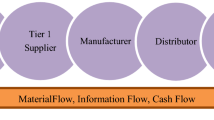Abstract
One of the main research issues in supply chain management is to improve the global efficiency of supply chains. However, the improvement efforts often fail because supply chains are complex, are subject to frequent changes, and collaboration and information sharing in the supply chains are often unfeasible. This paper presents a practical collaboration framework for supply chain management wherein multi-agent systems form dynamic information networks and co-ordinate their production and order planning according to synchronised estimation of market demands. In the framework, agents employ an iterative relaxation contract net protocol to find the most desirable suppliers by using data envelopment analysis. Furthermore, the chain of buyers and suppliers, from the end markets to raw material suppliers, form dynamic information networks for synchronised planning. This paper presents an agent-based dynamic information network for supply chain management and discusses the associated pros and cons.
Similar content being viewed by others
References
Chen F, Drezner Z, Ryan J K and Simchi-Levi D: 'Quantifying the bullwhip effect in a simple supply chain: the impact of forecasting lead times, and information', Management Science, 46, No 3, pp 436-443 (2000).
Kim J B: 'Multi-Component Contingent Auction (MCCA): A Procurement Mechanism for Dynamic Formation of Supply Networks', Proceedings of International Conference on e-Commerce, Pittsburgh, USA (2003).
Sun J and Sadeh N M: 'Dynamic supply chain formation: integrating multi-attribute auctions and finite capacity scheduling', Proceedings of the 4th ACM conference on Electronic commerce, San Diego, CA, USA, pp 244-245 (2003).
Yu Z, Yan H and Cheng T C E: 'Benefits of information sharing with supply chain partnerships', Industrial Management and Data Systems, 101, No 3, pp 114-119 (2001).
Banker R D and Charnes A: 'An introduction to data envelopment analysis with some of its models and their uses', Research in Governmental and Nonprofit Accounting, JAI Press, 5, pp 125-163 (1989).
Barbuceanu M, Teigen R and Fox M S: 'Agent based design and simulation of supply chain systems', Proceedings of the 6th Workshop on Enabling Technologies Infrastructure for Collaborative Enterprises (WET-ICE '97), pp 18-20 (1997).
Nissen M E: 'Agent-based Supply Chain Disintermediation versus Re-intermediation: Economic and Technological Perspectives', International Journal of Intelligent Systems in Accounting, Finance and Management, 9, pp 237-256 (2000).
Qinghe H, Kumar A and Shuang Z: 'A bidding decision model in multi-agent supply chain planning', International Journal of Production Research, 39, No 15, pp 3291-3301 (2001).
Shen W, Kremer R, Ulieru M and Norrie D: 'A collaborative agent-based infrastructure for Internet-enabled collaborative enterprise', International Journal of Production Research, 41, No 8, pp 1621-1638 (2003).
Swaminathan J M: 'Modeling supply chain dynamics: A Multiagent Approach', Decision Sciences, 29, No 3, pp 607-632 (1997).
Pontrandolfo P, Gosavi A, Okogbaa O G and Das T K: 'Global supply chain management: a reinforcement learning approach', International Journal of Production Research, 40, No 6, pp 1299-1317 (2002).
Fox M S, Barbuceanu M and Teigen R: 'Agent-Oriented Supply-Chain Management', International Journal of Flexible Manufacturing Systems, 12, No 2/3, pp 165-188 (2000).
Mondal S and Tiwari M K: 'Formulation of mobile agents for integration of supply chain using the KLAIM concept', International Journal of Production Research, 41, No 1, pp 97-119 (2003).
FIPA-http://www.fipa.org/
FIFA00030: 'FIPA Iterated Contract Net Interaction Protocol Specification', (2001)-<http://www.fipa.org/specs/fipa00030/>
Kwon O B and Lee J J: 'A multi-agent intelligent system for efficient ERP maintenance', Expert Systems with Applications, 21, No 4, pp 191-202 (November 2001).
FIPA00026: 'FIPA Request Interaction Protocol Specification', (2000)-http://www.fipa.org/specs/fipa00026/
FIPA00027: 'FIPA Query Interaction Protocol Specification', (2000)-http://www.fipa.org/specs/fipa00027/
Bellifemine F, Caire G, Poggi A and Rimassa G: 'JADE-A White Paper', Special Issue on JADE, Telecom Italia Lab Journal EXP, 3, No 3, pp 6-19 (2003).
Author information
Authors and Affiliations
About this article
Cite this article
Ahn, H.J., Lee, H. An Agent-Based Dynamic Information Network for Supply Chain Management. BT Technology Journal 22, 18–27 (2004). https://doi.org/10.1023/B:BTTJ.0000033467.83300.c0
Issue Date:
DOI: https://doi.org/10.1023/B:BTTJ.0000033467.83300.c0




